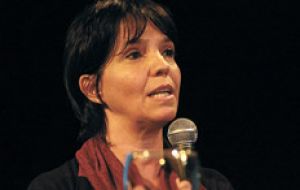MercoPress. South Atlantic News Agency
“Cooling the economy or appreciating the currency” backfire for developing countries
 Central bank president Mercedes Marcó del Pont defended Argentina’s policy of boosting domestic demand and cutting sovereign debt
Central bank president Mercedes Marcó del Pont defended Argentina’s policy of boosting domestic demand and cutting sovereign debt Central bank president Mercedes Marcó del Pont defended on Friday Argentina’s current economic policies, particularly efforts to address the international crisis arguing that “cooling the economy or letting the currency appreciate only aggravates the crisis”.
“Traditional thinking claims that cooling the economy or letting currencies appreciate is the solution but these measures can generate second effects that only aggravate the situation”, said Marcó del Pont during the opening of the Monetary and Banking Seminar organized by the Argentine central bank
In Argentina “we have suffered those experiences” and the focus of “our economic policy is growth and the defence of our domestic market with recovery of jobs” said the economist who also underlined the importance of cutting sovereign debt, “it’s a fantastic mechanism to have autonomy to boost growth”.
Marcó del Pont also underlined the importance of integrating to economic discussions social issues such as inequality, “not because we believe that it is the nice thing to do, but rather from the conviction that if we really want to come up with an alternative vision of the crisis, we must reconcile monetary-financial issues with what happens in the area of accumulation and distribution of wealth”.
The Argentine official said that the inequality gap “regarding unemployment and loss of salaries” has obviously increased in the central countries because of the way they have addressed recession and the crisis. When you look at the way the cost of the crisis is being distributed, not on the back of the creditors but on the backs of debtors, “it is plain clear what is happening and who is suffering”.
Marcó del Pont also dedicated a few words to the soaring international prices of energy and food and its inflationary effects on developing countries, which if not properly addressed only creates further inequality.
“The inertia of conventional thinking when we have external shocks situations is to further adjust and cool demand by appreciating the currency. These recommendations what show us are secondary effects that only make the situation from a social and inequality point of view even more serious, with a scenario worse than when it started and correction was intended”.




Top Comments
Disclaimer & comment rulesCommenting for this story is now closed.
If you have a Facebook account, become a fan and comment on our Facebook Page!